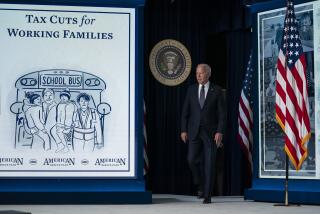Congressional Democrats seem to warm to Obama’s tax cut plan
WASHINGTON -- Congressional Democrats, usually struggling with some level of discord over tax issues, seemed suddenly less combative after emerging from a closed-door session with President Obama’s top surrogates, advisor David Axelrod and Treasury Secretary Timothy Geithner.
Call it their game face, but at a lunch session that was described as “lively” and “healthy” with Senate Democrats on Tuesday, lawmakers left with a show of not quite unity, but something more like an evolving party position.
The White House visit to House and Senate Democrats came a day after Obama pressed forward with plans to keep tax breaks for one year for those families earning less than $250,000 a year, while letting rates rise for households earning more than that. The tax rates, which had been established under the George W. Bush administration, expire in December.
Obama’s move launches a summer of congressional votes on a tax position that conservative-leaning Democrats and those from high-income regions have been reluctant to embrace, and a counterpunch from congressional Republicans who promised proposals to keep tax rates low for all Americans, even the wealthy earning more than $250,000. The votes will put lawmakers from both parties in a bind.
But Democrats took refuge in polls showing Americans largely agree with the president that the upper-income earners should pay more.
“We can agree on the $250,000 tax cut now, and if there’s a possibility to go higher later, we can,” said Sen. Mary Landrieu (D-La.) “But what I think is important now is to get to a consensus about sending a positive signal to the middle class.”
Democratic Sen. Joe Manchin of West Virginia, who has not been a fan of the raising taxes only on those earning more than $250,000, was notably noncommittal.
“You have to look at the proposals that are out there,” Manchin said. “The president put a proposal out there that basically takes care of a certain amount of people; there’s another proposal that kicks the can down the street for a long time. We’ll look at the whole thing.”
Senate Majority Leader Harry Reid (D-Nev.) acknowledged differences remain. “I can’t say unanimous,” Reid said.
Geithner made a compelling case, lawmakers said, in economic and budgetary terms, while Axelrod outlined the political landscape in the swing states heading toward the November election.
Democrats’ resolve appeared strengthened as it becomes clear that Republicans will probably block the tax break for the middle class. The GOP says it, too, wants to extend tax breaks, but Republican leaders do not want to separate the lower-end tax breaks from those on upper-income earners, worried about losing leverage in negotiations.
Rep. Nancy Pelosi (D-San Francisco), who had pushed at one point for the $1-million threshold, gave a hearty endorsement of the president’s approach.
Some noted that allowing tax rates to rise only on the top earners, those making more than $1 million, would cost the government more than if rates were lifted on those at the $250,000 level.
“We have to be very sensitive to what it does to the deficit,” said Sen. Mark Pryor (D-Ark.) “We cannot just continue to do tax cut after tax cut after tax cut, and not link it.”
But, the senator added, questions among Democrats remained – many that were aired at the closed-door meeting.
Follow Politics Now on Twitter
Twitter: @LisaMascaroinDC
More to Read
Get the L.A. Times Politics newsletter
Deeply reported insights into legislation, politics and policy from Sacramento, Washington and beyond. In your inbox three times per week.
You may occasionally receive promotional content from the Los Angeles Times.











